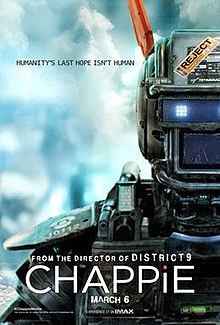
Released: March 6th,
2015
Rated: R
Distributor: Columbia Pictures
Starring: Sharlto Copley, Dev Patel, Ninja, Yolandi
Visser, Jose Pablo Cantillo, Sigourney Weaver, Hugh Jackman
Directed by: Neill Blomkamp
Written by: Neill Blomkamp, Terri Tatchell
Personal Bias Alert: likes allegorical sci-fi, not seen anything by Blomkamp
4.9 of 10
The
frustrating thing about Chappie is
how much it does right. The positives
aren’t hidden, and they’re easy to appreciate.
But they’re surrounded by flaws both big and small, so that even when
you’re reveling in Chappie’s good choices,
you have to push aside its distracting mistakes.
This
is the third feature film from writer/director Neill Blomkamp, all of which are
the sort of heavily allegorical sci-fi pieces where you understand the allegory
from just the plot summary. Chappie is about the definition of consciousness
and life, played out through the struggle of the world’s first sentient
robot. Nicknamed Chappie, he was one of
the robotic police officers used in Johannesburg that had been damaged and
scrapped, only to be stolen by developer Deon (Dev Patel) for a trial run of his
A.I. side project. Chappie is then
stolen from Deon (that’s karma) by a group of thugs, who raise him as one of
their own.
This
period, where Chappie is learning about the world, is where the movie
shines. Chappie looks astounding thanks
to the work of animators at Image Engine and Weta Workshop as well as the
performance by Sharlto Copley. There was
no motion capture involved, but Copley performed the part on set and lent his
voice to the final cut, giving the animators detailed body movements and
emotional cues to work from. Chappie, along with last year’s Dawn of the Planet of the Apes, are the
only films to feature CGI characters that actually look like they’re in the
same frame as everything around them, and that feat still leaves me
floored. The design of the character is just as important to this feat as
the animation, and again Chappie draws
top marks. Drawing heavily from previous
robot creations like the droids from the Star
Wars prequels, the designers added small touches like emotive, ear-like antennae
that bring much needed depth of emotion to the robotic character.
Thanks to Chappie’s beautiful rendering, it’s
easy for the audience to form an emotional bond to the child-like robot. Yes, he’s big and tough, but he’s also naïve and
lost, struggling to find his way in this brave new world. The amount of compassion this engenders might
catch you off guard, especially in a scene where he’s abused by a rival
developer played by Hugh Jackman. Establishing
this connection goes a long way towards making the rest of the film work,
especially after the film trades in these emotional beats in favor of big,
violent action.
The distracting
mistakes of Chappie mostly stems from
its writing, which fails to deliver rounded characters, a plausible plot, and
any sort of idea about the themes and allegories its playing with. Pretty much everything but Chappie himself is
a farce, as other characters are too extreme to be taken seriously and plot
points are shoved in to move the story forward without any regard to reality. Not helping things is the fact that two non-actors
were cast in main roles, Ninja and Yolandi Visser of the band Die Antwoord, who
seem to be playing their stage personas and lack the ability to convey complicated
emotions. However, it’s the horribly
overdone performance by Hugh Jackman that stands out as the worst. Granted, his character was the most poorly
written, but I don’t know how anyone watched his flailing performance in the
climactic battle and didn’t call for a reshoot.
A
story about the first artificially intelligent machine naturally brings up
questions of consciousness and existence, and it’s astoundingly disappointing how
much these are glossed over in Chappie.
Instead of any actually debate about the
answers to these questions, the movie simply chooses one path to go down and
never looks back, if it even stops to examine the question at all. There’s a point where the plot stumbles right
into the scenario posited in the Swampman thought experiment, but I’m going to assume
that the writers had never heard of it considering that the question it raises
is never even acknowledged. I, however,
had this and many other questions gnawing at the back of my brain the entire
time, which made the plot really hard to swallow.
And
yet, as frustrating as all these faults are, Chappie comes very close to working. Blomkamp knows how to film action sequences,
and Chappie himself is so endearing that you remain emotionally invested even
when the plot does spin out of control.
That you care so much about the robocop is a feat, but most everything
else is just a mess.
Other
Notes:
Ø One
character is subtitled. I think it’s
because he was speaking broken English with a thick accent (it’s possible it
was a different language), but either way, it stuck out like a ridiculous sore
thumb.
Ø This
is the kind of movie where the big, indestructible robot continuously gets
distracted by guys with little guns that aren’t doing any damage to him.
Ø It’s
like they tried to make an intellectual film, but forgot to put in the intellect.
Ø Here’s
an article about how Chappie was animated:
http://blogs.indiewire.com/thompsononhollywood/how-they-did-it-chappie-learns-to-be-a-real-gangsta-exclusive-clip-20150306

No comments:
Post a Comment